Posted on 4/23/2021
.jpeg)
There is nothing worse than a stuttering engine, especially in bad weather. Yet, many things can cause that stutter, and one of them is an old spark plug. It throws all the other spark plugs out of sync eventually too and the car may choke off until the spark plugs are professionally replaced. Spark plugs are a necessary part of the vehicle and should not be neglected. Taking care of essential parts of a vehicle will not only save the owner time but also money, and regularly servicing the vehicle and changing old spark plugs is no exception. That faulty spark plug could mean the difference between making it to an important meeting or not, picking the children up after school, and many other scenarios. It is better to take care of problems before they arise in order to ensure everything in the vehicle is in good running condition. If spark plugs are faulty, a driver can expect reduced gas mileage as dirty spark plugs will make the car burn more fuel. The engine can also misfire as the ... read more
Posted on 3/16/2021
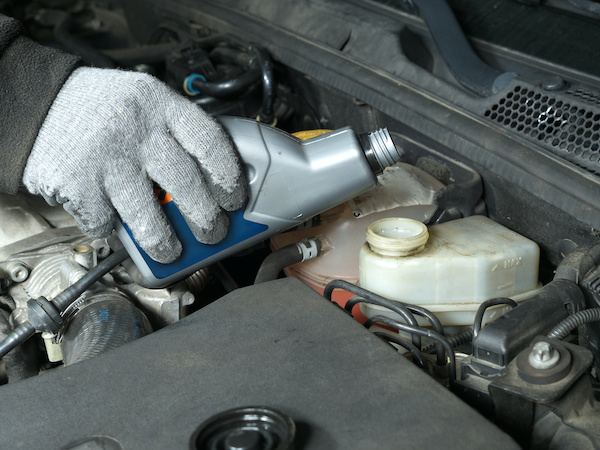
Have you taken a break to check your brake fluid recently? There are many different fluids in your vehicle that keep it running smoothly and safely. One of the most important fluids in your car is the brake fluid. Essentially, the brake fluid is what moves the different parts of your vehicle's braking system. Brake fluid helps to deliver the force necessary to stop your wheels when you hit the brake pedal. Without brake fluid, your brakes don't work. Making sure that your car has the proper amount of brake fluid is an easy way to stay safe on the road and avoid unexpected accidents. There are several signs that indicate your car is low on brake fluid. 1. Your Anti-Lock Braking System (ABS) light turns on. In a modern car, your dashboard will light up with the ABS light. This is the easiest way to tell that your brake fluid needs to be changed. 2. Your brakes aren't responding like they used to. If your brake pedal feels firmer or softer, it could indica ... read more
Posted on 2/18/2021
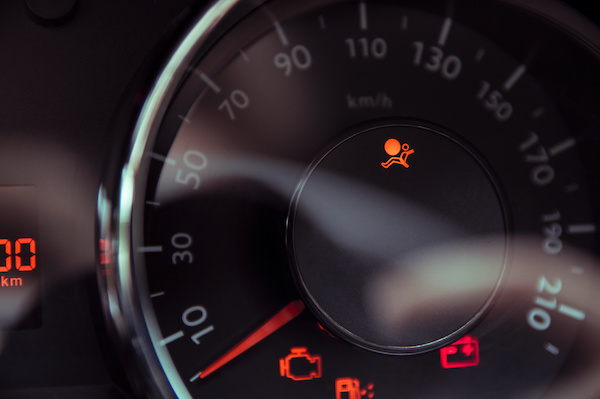
On-board diagnostics (OBD) is a vehicle's capability to self-diagnose and report problems. This diagnosis ability allows mechanics to access the vehicle's sub-systems to see which systems are experiencing issues, so they can be corrected. Why is OBD Essential? On-board diagnostics is essential because it helps mechanics better understand the issues your car is experiencing, helping them to correct the problem at its source. OBD has a variety of benefits. What Are the Benefits of OBD? Quick Testing One of the most popular benefits of on-board diagnostics is quick testing. When it comes to vehicle maintenance, you may plan ahead to leave your car overnight or for a few days to have the necessary repairs performed. OBD testing is quick and easy to perform, making diagnosing car problems quickly, so mechanics can move on to the repair process. Fault Codes If you have a newer model car, you have the advantage of fault codes. These codes are s ... read more
Posted on 1/21/2021

Have you ever experienced the terror of your car turning sideways and felt like you had no control over your vehicle? Here are some tips to help you drive safely in winter weather. 1. Slow Down Whether rain, snow, wind, or fog, the most important thing you can do is lower your speed. Not only are you usually visually impaired in rough weather, slowing down lessens the chances of sliding on rain or snow and also keeps high winds from pulling the steering wheel out of your grasp. 2. Leave Plenty of Room Between the Car Ahead of You Even if you're driving safely and slowly, bear in mind the person ahead of you might not have the same mindset or experience with the weather situation. They may start to slip and slide and you want to have as much room as possible to come to a safe stop. 3. Plan Ahead Leave early for your destination so that you won't be prone to drive too fast. Scrape ice or snow off your windshield. Let y ... read more
Posted on 12/15/2020
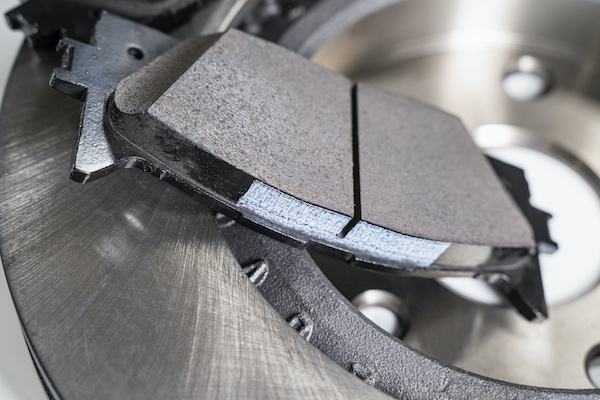
Road safety and well maintained braking systems go hand in hand. Break failure can cause catastrophic road accidents. Regular brake checks, maintenance and repair, is vital to ensure they function correctly. As an essential car component, there have been significant improvements in the braking system over the years with the development of new technologies that have made advancements in the braking system possible. The most prominent types of brakes are drum and disc brakes, which differ significantly. Brake Drums Although drum brakes still exist in some vehicles today, they were an older version of brakes that features a simple design with low manufacturing costs. They were mainly made from cast iron and functioned by forcing the two arched shoes placed within the drum. Whenever the driver depresses the brake pedal, pressed brake fluid is forced into the drum brake constraining the pistons to press against the drum sides. The friction results in slow spinning of the wheels and even ... read more
Posted on 11/27/2020
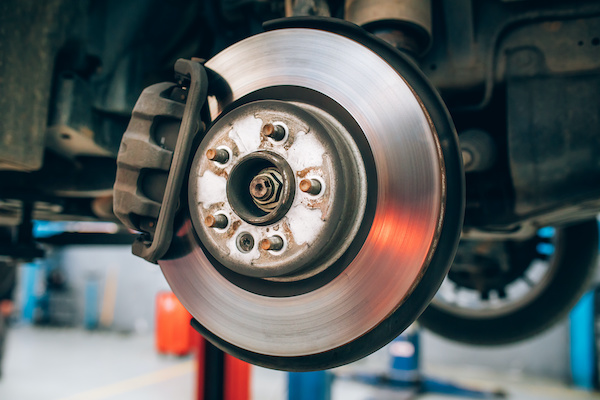
Brake pads create the necessary friction and force to stop your vehicle. Their maintenance is an integral part of handling, drivability, and safety. Over time, heat and friction can wear the brake pads. In some cases, the brake pads can wear at different rates depending on the environment and your driving habits. If your commute has a lot of city driving, you'll use the brakes more frequently than freeway driving. However, braking at high speeds can wear the brake pads exponentially faster than at lower speeds. Brake wear is also dependent on the type of vehicle you drive, but you can do techniques to get the most out of your brake pads. Below are three tips to implement to increase the lifespan this winter. Lighten the amount of weight you carry in your vehicle. Excess weight will cause you to press harder on the pedal to slow down the same distance if there wasn't additional weight. Increase your stopping distance. Harsh braking that is har ... read more
Posted on 10/23/2020
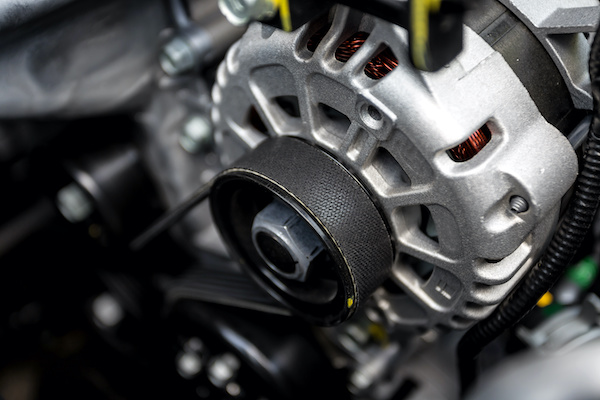
The alternator plays a vital role in the electrical systems within your vehicle. It turns the energy from within the crankshaft into electricity that your car needs to power the battery and other essential parts of the electrical system. In ideal conditions, the alternator can last 7-10 years. If the alternator does begin to wear, various other electrical components also start to fail. While the alternator can fail randomly, some drivers notice minor vehicle issues happening overtime. If you suspect your alternator is beginning to fail, below are five common symptoms that indicate a problem is on the rise: • Battery Indicator Light The battery light will illuminate on the dashboard or the letters ALT if the alternator is giving out. This can alert you that there are electrical issues that need your attention. • The Battery is Weak If the alternator can’t charge the battery, the battery will be weak and inconsistent. One ... read more
Posted on 9/24/2020

Drivers aren’t just keeping their vehicles for several years; they’re driving more miles in a shorter period of time. Cars are expensive, and not every individual can purchase a new one once it hits over 100,000 miles. Today, it’s about protecting your investment. While modern vehicles are built more sturdily, they still need consistent servicing to optimize performance. Once a car enters the high mileage club, constant vehicle maintenance helps increase longevity, handling, and fuel efficiency. Below are a few tips to keep your high mileage vehicle running several thousand miles long. Stay consistent with the owner’s manual recommended services. Vehicles need regular checkups just as we do. A tune-up is a perfect time to have an inspection to ensure that everything is running smoothly and efficiently. Tune-ups also catch any issues before they lead to costly repairs. Get Regular Car Washes. Keeping your vehicle clean inside a ... read more
Posted on 8/31/2020

Learning how to drive is a great step towards independence. While it’s exciting to learn, it can get very intimidating when other vehicles speed off near you and cut you off on the road. The trick to being a good driver is being a comfortable driver. When you’re comfortable, you’re confident. Becoming comfortable takes time and practice behind the wheel. Below are a few helpful tips for the new driver on the road: Stay Distraction-Free. After you put your seatbelt on and start your car, make sure you have a clear idea of your route or destination. If you aren’t sure, have your GPS on and ready. Make a habit out of ensuring everything in the vehicle is adequately stored and strapped in, so nothing falls during the trip. Also, make sure your ringer is off. Most newer cars come with Bluetooth capabilities, but you shouldn’t be taking any calls at this point as a new driver. Make Adjustments Before Hitting the Road. Before d ... read more
Posted on 7/31/2020
They say dogs are a man’s best friend, so what better way to spend your free time than a road trip with your furry pal. For some dogs, a road trip is a joyful experience, while for others, it may leave them nervous and tense. Some dogs even get nauseated and car sick. To ensure your road trip will be a fun and stress-free experience for you and your pup, you should follow a few tips. Below are some suggestions for making your drive safe and enjoyable for your dog: What types of drives is your dog used to? The trips your dog takes should be varied. If you only drive your pup to the doctor to get shots, car rides can be nerve-wracking. Help your pup associate car rides with a pleasant experience like play dates, dog parks, or puppy spas. Make road trips an enjoyable experience for your pup. Make sure you pack your dog’s essentials. Before starting your trip, make sure you have bags for poop, water, bowl, treats, safety harness, crate, etc. You should be ... read more